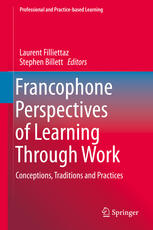

Most ebook files are in PDF format, so you can easily read them using various software such as Foxit Reader or directly on the Google Chrome browser.
Some ebook files are released by publishers in other formats such as .awz, .mobi, .epub, .fb2, etc. You may need to install specific software to read these formats on mobile/PC, such as Calibre.
Please read the tutorial at this link: https://ebookbell.com/faq
We offer FREE conversion to the popular formats you request; however, this may take some time. Therefore, right after payment, please email us, and we will try to provide the service as quickly as possible.
For some exceptional file formats or broken links (if any), please refrain from opening any disputes. Instead, email us first, and we will try to assist within a maximum of 6 hours.
EbookBell Team

0.0
0 reviewsThis book generates a comprehensive account of ways in which practice-based learning has been conceptualized in the Francophone context. Learning for occupations, and the educational and practice-based experiences supporting it are the subject of increased interest and attention globally. Governments, professional bodies, workplaces and workers are now looking for experiences that support the initial and ongoing development of occupational capacities. Consequently, more attention is being given to workplaces as sites for this learning. This focus on learning through work has long been emphasised in the Francophone world, which has developed distinct traditions and conceptions of associations between work and learning. These include ergonomics and professional didactics. Yet, whilst being accepted and of long standing in the Francophone world, these conceptions and traditions, and the practices supporting them are little known about or understood in the Anglophone world, which is the dominant medium for scientific and educational discussion. This book addresses this problem through drawing on accounts from France, Switzerland and Canada that make accessible and elaborate these traditions, conceptions and practices through examples of their applications to occupationally related learning. These accounts offer variations and culturally-specific developments of these traditions, but collectively emphasize a preoccupation with how both work and learning need to be understood through situated considerations of persons enacting their work practice. In this way, they offer noteworthy and worthwhile contributions to contemporary global considerations of learning through work.